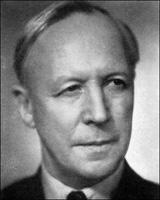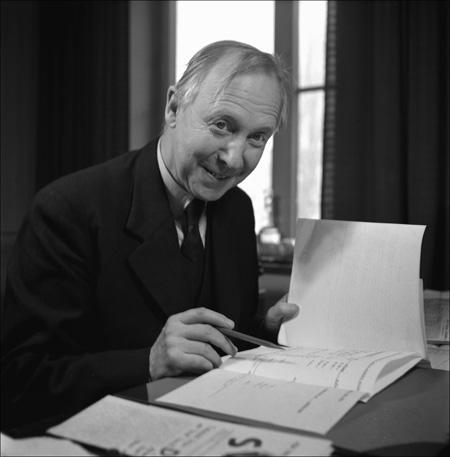Ernst Wigforss

Ernst Wigforss, the fourth of seven children was born in Halmstad, Sweden on 24th January 1881. His father, Frans Wigforss, was a master painter and a descendant of a long line of artisans. His mother, Tekla Wigforss, an "intelligent, imaginative and passionate... made the greatest impact on Ernst's emotional and intellectual development." (1)
Wigforss studied at Lund University from 1899, and completed a doctorate in 1913. He taught at the gymnasium in Lund and as lecturer of German and Swedish at the gymnasium in Gothenburg.
In 1919 Wigforss was elected as a Social Democratic Workers' Party member of the First Chamber of the Swedish Parliament, representing Gothenburg, and he became a member of various committees. He was appointed a member of the cabinet of Hjalmar Branting (1924-1925) and the cabinet of Rickard Sandler (1925-1926). Wigforss agreed with Banting when he argued that the "contemporary social democracy's fundamental idea... is that it preserves the essentials of Marxism but does not swear by the master's words as infallible, least of all those passages dated by changing circumstances." (2)
After the Wall Street Crash the whole of Western Europe was impacted by the Great Depression. This was true of Sweden and by 1931, industrial production had declined by 10.3%. Wigforss argued: "We socialists cannot accept a system... where up to 10% of the workers must be unemployed, and during worse times, even more. We refuse to admit that this is necessary and natural despite how much people come armed with theories stating that this must be so." (3)
In the 1932 General Election, the Social Democratic Party won 41.7% of the seats. The minor left-wing parties, including the Independent Socialist Party (5.3%) Communist Party (3.0%) agreed to form a minority government with the SDP leader, Per Albin Hansson, as prime minister. Although they did not join the government the Farmers' League agreed to keep them in power in return for support for their agriculture policy. (4)
Hansson appointed Ernst Wigforss, as his finance minister. He had read the works of John Maynard Keynes and kept in constant contact with the British economist. (5) After leaving the Gold Standard he devalued the Krona, reducing the price of Swedish exports. Wigforss proposed a public work program designed to put unemployed back to work even if this meant budget deficits. This was a radical departure from the policies of previous governments. A balanced budget had always been the main objective. Usually, government loans were only used for investments that were expected to generate future profits such as postal services, railroads or electric power supply. (6)

The first unbalanced budget proposed by Wigforss for the years 1933 and 1934 was criticized for causing inflation and "depriving businesses of capital necessary for their development". To counter these arguments, the Social Democrats moved away from financing public work programs through deficits and proposed an inheritance tax used to finance their plans. The policies of deficit spending and government intervention in the economy, began the creation of the Swedish Welfare State. Wigforss argued for creating "provisional utopias... tentative sketches of a desirable future... They served as a critique of existing social conditions and as a guide to present action, yet could be revised with future experience." (7)
In June 1936, the uneasy majority enforced Hansson's resignation, leaving League chairman Axel Pehrsson-Bramstorp to form a three-month "Holiday Cabinet" until the elections in September. (8) The 1936 General Election saw a surge in support of the Social Democrats with 45.9% of the vote. Along with the Independent Socialists (4.4) and Communist Party (3.3), Hansson formed the next government. This was a popular government and in 1940 General Election the Social Democrats won an overall majority with 53.8% of the vote. Per Albin Hansson declared: "We Social Democrats do not accept a social order with political, cultural and economic privileges or one where the private-owned means of production are a way for the few to keep the masses of people in dependence." (9)
Left-wing economists in Britain such as Evan Durbin, George Douglas Cole, Hugh Gaitskell, Richard Tawney, Leonard Trelawny Hobhouse and J. A. Hobson, found Wigforss's policies inspirational as the most successful Social Democratic Party in Europe: "They noted enthusiastically that in Sweden, alone in Europe apart from the Soviet Union, the socialized sector of the economy was already extensive. It included the Post Office, most of the railways, most electric power, forests, the Riksbank, air transport, radio services, tobacco, liquor, and even some iron-ore mining.... The appeal of Sweden lay not in its modest experiments in public ownership, but rather in weaving together exchange rate policy, deficit budgeting, and a public works programme. Sweden was hailed as a socialist regime committed to efficiency and modernization, and to the achievement of consumer affluence." (10)
Hugh Dalton and Brinley Thomas both had a long meeting with Ernst Wigforss and Gunnar Myrdal, the Minister of Trade, where he discussed the economic measures they had introduced. Thomas published a book, Monetary Policy and Crises: a Study of Swedish Experience (1936). In the introduction written by Dalton, he extolled the virtues of the Swedish recovery, "based largely on the theories of Gunnar Myrdal, and executed with great political skill and economic foresight by Ernst Wigforss, the brilliant Finance Minister." (11)
In 1937 a team of Labour Party economists visited Sweden and the following year published a book on its economic experiment, Democratic Sweden (1938), edited by Margaret Cole. It included an essay by Hugh Gaitskell, entitled The Banking System and Monetary Policy. "The combined efforts of academic economists, experienced bankers and sagacious Socialist politicians have secured for her the pursuit of what in an imperfect world was probably the best monetary policy available." (12)
Ernst Wigforss was Minister of Finance in the cabinet of Tage Erlander. In July 1949, at 69 years-old, and after his eighteenth budget, Ernst Wigforss resigned. He wrote in his memoirs: "I left the government because what a treasurer now had to do others could do as well, in part better, and because freedom beckoned." (13)
Ernst Wigforss died, aged 95, on 2nd January 1977.
Primary Sources
(1) Geoff Dow and Winton Higgins, Politics against Pessimism (2013)
Ernest Wigforss enjoyed a relatively untroubled and happy childhood. His memoirs exude a compelling warmth towards not only his family (especially his vivacious mother) but also his schoolmates and teachers. He excelled at school, but also indulged in the usual pastimes and escapes at his age and gender in the unspoiled and accessible waterways and countryside around Halmstad. Several of his school friends (like many he would make at university) remained part of his circle until they died. He grew up to be an emotionally secure and harmonious individual who deeply honoured his closest relationships and friendships.
Student Activities
References
(1) Geoff Dow and Winton Higgins, Politics against Pessimism (2013) page 70
(2) Sheri Berman, The Social Democratic Moment: Ideas and Politics in the Making of Interwar Europe (1998) page 49
(3) Sheri Berman, The Primacy of Politics: Social Democracy and the Making of Europe's Twentieth Century (2006) (2006) page 170
(4) Karl Molin and Klas Amark, Creating Social Democracy: A Century of the Social Democratic Labor Party in Sweden (2000) pages 139-140
(5) Robert Skidelsky, John Maynard Keynes: The Economist as Saviour (1992) page 488
(6) Sheri Berman, The Primacy of Politics: Social Democracy and the Making of Europe's Twentieth Century (2006)page 170
(7) Sheri Berman, The Social Democratic Moment: Ideas and Politics in the Making of Interwar Europe (1998) page 49
(8) John Gilmour, Sweden, the Swastika and Stalin (2011) pages 23-25
(9) Sheri Berman, The Primacy of Politics: Social Democracy and the Making of Europe's Twentieth Century (2006) page 170
(10) Kenneth O. Morgan, Labour People: Leaders and Lieutenants (1987) pages 115-116
(11) Hugh Dalton, included in Brinley Thomas, Monetary Policy and Crises: a Study of Swedish Experience (1936) pages ix-xi
(12) Hugh Gaitskell, The Banking System and Monetary Policy, included in Margaret Cole (editor) Democratic Sweden (1938) pages 96-107
(13) Geoff Dow and Winton Higgins, Politics against Pessimism (2013) page 183
John Simkin
